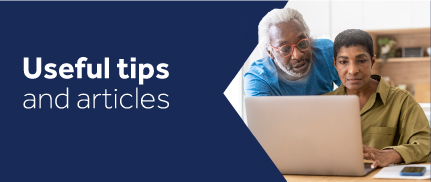Tips to help keep your accounts safe
We use lots of security measures to protect your money and personal information online but there are also things you can do to keep your money safe.
Do
-
Be vigilant and always be alert of the threat of scams.
-
Choose a strong password. When choosing your password use a mixture of letters and numbers and avoid using names or date of births. An easy way to create a strong password is to combine three completely unrelated words or a phrase such as 'my first car is Toyota 98 model', which could become 'M1CIT98M'.
-
Use different passwords for every online account - it will avoid fraudsters getting in to your other accounts. If one of your account's details are stolen due to a data breach or if you've been hacked, fraudsters can use the same details to get into your other accounts.
-
Keep your password secure.
-
Regularly check your accounts - if you see any unusual changes on your account (such as an unknown transaction or incorrect last login details) please report it immediately.
-
Keep your contact details with us up to date. We may need to contact you by phone, email or letter if we notice unusual activity on your account.
-
Keep your computer and other mobiles devices up to date with the latest anti-virus, anti-spyware and software updates.
-
If you think anyone else knows your secure details or you've lost your passbook, please report it immediately.
-
Stay scam smart - keep up to date with the latest scams.
-
Ensure that you shred any important documents which include personal and/or financial details e.g. bank statements, utility bills.
Don't
-
Never share your secure details (such as user name or full password) with anyone.
-
Never send any confidential account information via email or phone; we'll never ask you to do this.
-
Never transfer your money out of your account at the request of an unknown caller. We'll never ask you to do this over the phone or email.
-
Never let someone you don't know access your computer or mobile devices, especially remotely.
-
Don't click on any links or open any attachments in suspicious emails or text messages. Delete them from your computer and block the sender’s email address and phone number.
-
Don’t feel embarrassed or ashamed – these criminals are clever at tricking you and reassuring you.
-
Never share your one time password with anybody.
Be cautious
-
Be suspicious of any unexpected calls, texts or emails from third parties asking for personal information.
-
Think twice before sharing personal information on social media sites - check the privacy settings. The more private, the safer you are.


